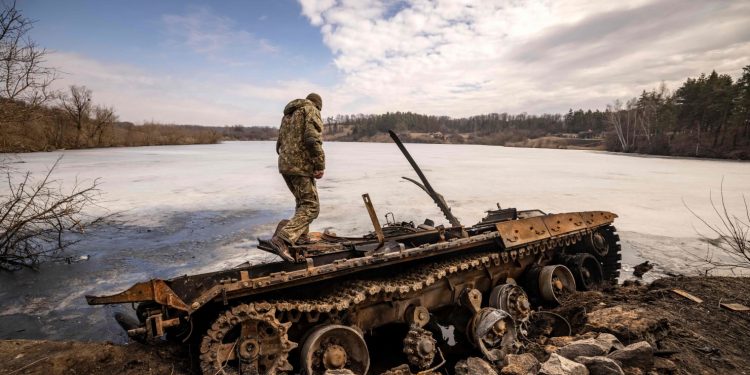A leading Kremlin mouthpiece has warned that the West’s overt backing for Ukrainian attacks on Russian territory could lead not to Russia’s defeat but to the “total annihilation” of Ukraine.
The warning from Margarita Simonyan, editor-in-chief of the propaganda outlets RT and Sputnik, came after further Ukrainian strikes overnight on the border city of Belgorod, a key supply center for Russian military forces in eastern Ukraine.
“Explosions and air defense sirens in Belgorod,” Simonyan wrote early Thursday in a message on Telegram. “The Anglo-Saxons publicly encourage Ukraine to take their hostilities into Russian territory. And they give them means to carry that plan out.
“What choice do you leave us, idiots? The total annihilation of what remains of Ukraine? A nuclear strike?”
In Putinist circles the term “Anglo-Saxons” can be used as a bit of a catch-all for malign Western influences, but there appeared to be little doubt that Simonyan’s message was referring to Britain.
British defence minister James Heappey prompted outrage in Moscow earlier this week when he said he thought it was “completely legitimate” for Ukrainian forces to strike against targets in Russia and it was “not necessarily a problem’” if they used weapons donated by Britain.
The British military has actively trained Ukrainian forces since Russia annexed Crimea and sent special forces into eastern Ukraine in 2014. The U.K. has also supplied large amounts of arms, including valuable mobile anti-tank weapons.
In an interview with Times Radio, Heappey said: “Ukraine was a sovereign country that was living peacefully within its owner borders and then another country decided to violate those borders and bring 130,000 troops across into their country.
“That started a war between Ukraine and Russia, and in war Ukraine needs to strike into its opponent’s depth to attack its logistics lines, its fuel supplies, its ammunition depots, and that’s part of it.”
Putin himself joined in the barrage in a speech to lawmakers in St Petersburg on Wednesday. “If someone intends to intervene in the ongoing events from the outside, and create strategic threats for Russia that are unacceptable to us, they should know that our retaliatory strikes will be lightning-fast,” he said.
“We have all the tools for this, things no one else can boast of having now. And we will not boast, we will use them if necessary. And I want everyone to know that.”
It is not the first time that Kremlin leaders or propagandists have warned of a nuclear conflagration, although the threats have become ever clearer and less veiled as the war drags on.
When he ordered the invasion on Feb. 24, Putin warned that those who tried to stop Russia achieving its aims would face “consequences that you’ve never faced in your history”—which was taken to mean nuclear weapons.
At that point, the invasion still appeared to be an almost comfortable imperialist adventure for Putin and his generals, who were super-confident that Ukrainian resistance would soon be snuffed out and the government of Volodymyr Zelensky ousted. But out-thought and outfought by better-prepared Ukrainian forces, the Russians suffered a humiliating setback in the battle for Kyiv.
Forced to retreat, the Russian military is now focusing its might on areas of eastern and southern Ukraine, where it is making costly but grinding progress as it tries to encircle Ukrainian forces in the east and take full control of the Black Sea coast up to Odesa.
The Ukrainian defence ministry said on Thursday that the Russians, who are now fighting under a single commander, were stepping up their offensives in both eastern Ukraine and in the south and “exerting intense fire” on all fronts.
In the early battle for Kyiv, Russia suffered painful losses at the hands of Ukrainian light infantry and special forces, who used their knowledge of the terrain to take out Russian columns—leaving behind the oxidised remains of Russian tanks and fighting vehicles, identifiable only by the letter “Z”.
Military experts say the latest phase of the war—just as crucial for Ukraine’s survival as a nation—is more conventional in terms of warfare, fought on flatter and more open terrain with the power of each side’s artillery key to success.
A number of Western nations are sending hundreds of artillery pieces, plus tens of thousands of shells, to Ukraine. The Pentagon on Wednesday published pictures of dozens of 155-mm howitzers being loaded onto an aircraft at the March Air Reserve Base in California.
The ever-increasing flow of weaponry into Ukraine presents a huge issue for the Russians, whose own munition factories are largely sitting idle for a lack of foreign-made components because of international sanctions. Hence the growing chorus of nuclear threats from the Kremlin and its mouthpieces.
Source by www.thedailybeast.com














































